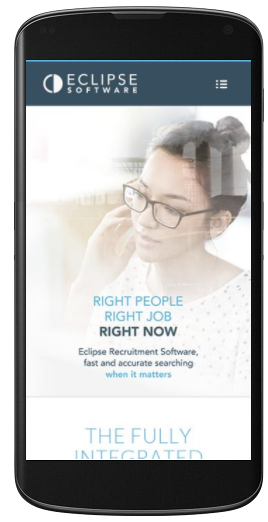
Google’s mission statement since 1998 has been to “organize the world’s information and make it universally accessible and useful.” Since mobile search overtook desktop search in 2015, Google has been wrestling with the conundrum that, to make information universally accessible to the majority of its users, therefore, it should be categorising, or ranking, websites based on their mobile experience.
But let’s go back a few steps, what is Google’s mobile first index and what does it mean for your recruitment agency?
What Is Google’s Mobile First Index?
Historically, Google categorised or indexed pages of your website by primarily crawling the desktop version of your website and ranking it based on the content it found. Google’s mobile first index was launched in 2018, and ranks priority based on the content that appears on the mobile version of your website. This means that, if your website is not mobile friendly, it could well have an impact on your overall ranking in search engines.
What Is A Mobile Friendly Website?
A mobile friendly, or mobile responsive, website is fundamentally a website that offers a positive user experience on a mobile device. Arguably the most popular way of achieving this is by offering identical content across both desktop and mobile that responds and adapts to the size of the screen it is being viewed on (see images below).


The majority of websites built in the last three years, for example WordPress websites, have a mobile responsive theme which adapts your desktop version to your mobile version so it all sits on one website.
What Does Google’s Mobile First Index Mean For Your Recruitment Agency?
To give you an idea of how Google’s mobile first index works, let’s look at a worst case scenario:
Your recruitment agency Talent+ Solutions had a website developed five years ago, offering a first class desktop experience; fast, accessible, easy to use with lots of relevant content for your target audience. However, when it was built, the developer didn’t make the website mobile friendly so it only displays the website in desktop form even when viewed on mobile. This means that the mobile users leave the site disappointed, do not find what they want and can’t read any of the content on the blog.
Despite having a terrible mobile experience, until Google’s mobile first index was launched, the website had been performing well, attracting a healthy amount of organic traffic* on desktop and receiving lots of client and candidate enquiries.
But since Google “now” indexes and ranks Talent+ Solutions by crawling its mobile website and categorising it in this way, just like the user, Google cannot easily identify what it is that Talent+ Solutions does and therefore penalises the overall website by ranking its pages lower in its search results. Consequently, three months later, Talent+ Solutions’ competitors outrank it for all relevant search terms, traffic across the site drops dramatically and online enquiries have all dried up.
This is an extreme example but entirely plausible. Currently, Google have not confirmed exactly how they are going to penalise websites but it is clear that, in the not too distant future, websites that ignore their mobile users will become subordinate to websites who have a navigable mobile experience. To avoid Google’s inevitable penalisation, here’s what you can do to prepare.
*Organic traffic is web traffic that comes from search engines, such as Google.
How To Prepare For Google’s Mobile First Index?
Back to reality – Google have made it clear that you have lots of time to make the necessary changes to your website before they roll out the mobile first index. They have also stipulated that:
“If you have a responsive site or a dynamic serving website where the primary content and markup is equivalent across mobile and desktop, you shouldn’t have to change anything.”
But if you are unsure about whether your website will be impacted by the mobile first index, you can:
- Check whether your website is mobile friendly using this tool.
- Check to see if you have structured data on your website using this tool. (Learn more about the importance of structured data in our blog).
- Check the speed of your website using this tool.
If you have any concerns, flag these with your web developer to make sure your website is prepared.
Google’s mobile first index should be viewed as an opportunity for you to overtake your competitors by providing a slick mobile experience that will attract more traffic from mobile users via Google and convert them into clients and candidates.
To learn how to make your website a lead generating machine, try inbound marketing. Download our free guide and get started today.
